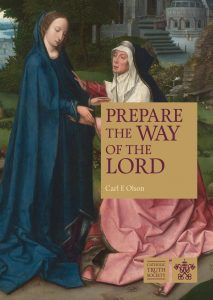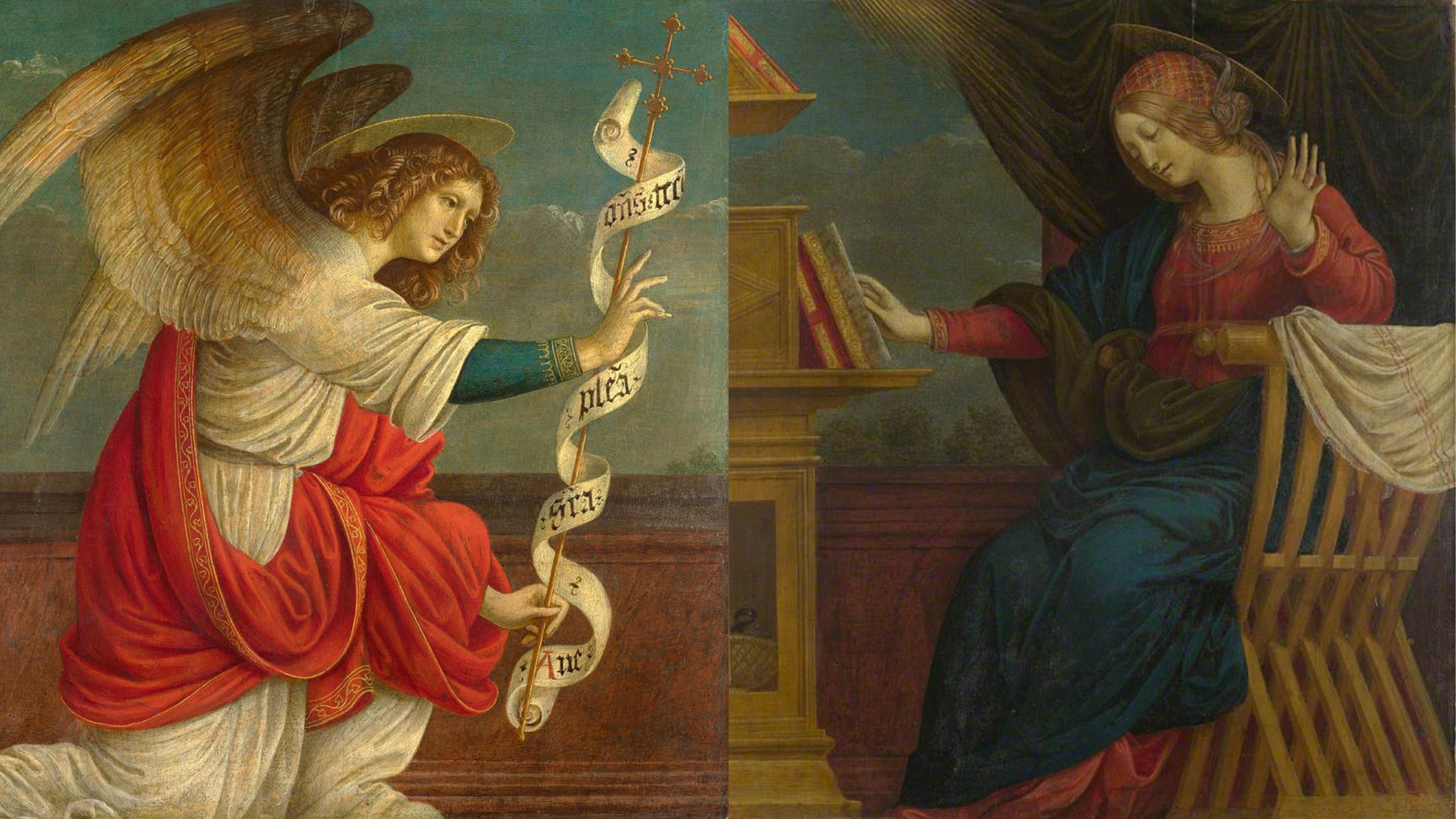“Blessed art thou among women and blessed is the fruit of thy womb…”
“Hail Mary, full of grace, the Lord is with thee!” Uttered by the heavenly messenger, Gabriel, to a Jewish maiden (Lk 1:28), these words, of course, make up the first phrase of the “Hail Mary”. The second phrase of that great prayer come from an earthly creature, Elizabeth, the cousin of Mary, who exclaims: “Blessed are you among women and blessed is the fruit of your womb” (Lk 1:42). St Bede remarks that this is fitting since the two remarks show that Mary “should be honoured by angels and by men and why she should indeed be revered above all other women”.
The reverence paid to Mary by Catholics and the Eastern Orthodox is bothersome to some Protestants (and even some Catholics!), who see in it undue attention given to a mere human. It is attention, they say, fitting to God alone. This is an unfortunate misunderstanding, and one that is sometimes made worse by the inability of Catholics to explain the place and meaning of Mary in Catholic doctrine and devotion. Advent provides an opportunity to more deeply contemplate Mary’s life as she emerges so prominently on the stage of salvation history during this season of preparation and anticipation.
Monsignor Ronald Knox once observed that Advent and Christmas mark “a return to our origins”. Having been given the incredible news by the angel, Mary makes a return of sorts to her own origins, travelling to visit her beloved cousin – likely the closest living relative she had. She journeyed three or four days to the “hill country, to a town in Judah” (Lk 1:39), filled with the joy of news that was undoubtedly still overwhelming and mysterious. Luke shows that those who are filled with the Holy Spirit are anxious to tell others about Christ. And in his description of Mary greeting Elizabeth, he makes a similar point: those filled with the Holy Spirit recognise their Saviour – even when they cannot see him. “And it came about that when Elizabeth heard Mary’s greeting,” the evangelist writes, “the baby leaped in her womb. And Elizabeth was filled with the Holy Spirit” (Lk 1:41). It is then that the older woman exclaims in wonder at the blessed state of her young cousin.
How blessed was Mary? It might seem a frivolous question considering that she carried the Incarnate Son in her womb. But in order to appreciate the reverence due to Mary, it should be noted that the phrase “blessed are you among women” is the Jewish way of saying: “You are the most blessed of women!” And why has Mary been chosen by the Most High to be the Mother of the Redeemer? Because of God’s grace and her faithful response to it, a fact that Elizabeth, herself a woman of great faith, recognised: “And blessed is she who believed that there would be a fulfilment of what was spoken to her from the Lord” (Lk 1:45).
Reflecting on Mary’s faith, the Catechism compares Mary to Abraham, who, because of his faith, became a blessing for all the nations of the earth. Mary, because of her faith, became the Mother of believers, through whom all nations of the earth receive him who is God’s own blessing: Jesus, the “fruit of thy womb”. (CCC 2676). This promise of salvation is also found in Psalm 72:17: “May his name be blessed for ever; as long as the sun his name shall remain. In him shall all the tribes of the earth be blessed; all the nations shall proclaim his happiness.”
In the original covenant made with Abraham in Genesis 12, the nomadic Patriarch is told by God that he will be made a “great nation”, that his name will be made great, and that he “shall be a blessing” to all the families of the earth. So what does it mean exactly to be blessed? The very first use of the word “bless” in Scripture is found in the creation account of the opening chapter of Genesis, which describes God looking upon the creatures of earth, blessing them, and declaring: “Be fruitful and multiply” (Gn 1:22). Then, after creating man, he blessed Adam and Eve and said, “Be fruitful and multiply and fill the earth, and subdue it” (Gn 1:28).
Blessing, then, is intimately connected to the gift of life. In the Old Testament, blessings were connected with prosperity, progeny and promise. Blessings and curses were central to the great covenants made with Abraham, Moses and David. With Mary, the blessing also involves prosperity, progeny and promise – but uniquely so, for her Son encompasses all of those things and makes them available to all people for the remainder of time. “For I tell you that Christ became a servant to the circumcised to show God’s truthfulness,” St Paul tells the Christians in Rome, “to confirm the promises given to the patriarchs, and in order that the Gentiles might glorify God for his mercy.” (Rm 15:8-9). The promises made to Abraham are fulfilled in Mary; the Advent of the Old Testament finds completion in the Son of the daughter of Sion.
The Second Vatican Council declared that:
This union of the Mother with the Son in the work of salvation is made manifest from the time of Christ’s virginal conception up to his death it is shown first of all when Mary, arising in haste to go to visit Elizabeth, is greeted by her as blessed because of her belief in the promise of salvation and the precursor leaped with joy in the womb of his mother. (Lumen Gentium, 57.)
Because of her perfect faith and co-operation with God’s grace, Mary is Mother of God and “mother of men, particularly of the faithful”. (LG, 54) Mary is revered because she faithfully said “Yes!” to God and gave birth to the God-man. She is loved because she is our mother and the first disciple of her Son, our Saviour.
During Advent all Catholics can emulate the example of Elizabeth, the cousin of Mary. Filled with the Holy Spirit, she anticipates her Saviour before ever seeing him. She worships her Lord, even when he is hidden in the womb. She reveres and embraces Mary, who brings salvation to her and to the entire world. She hears the “Magnificat” and rejoices as Mary sings, “For behold, from now on all generations will call me blessed” (Lk 1:48).
John the Baptist Prepares the Way for Christ
The prophet Isaiah and the evangelist Luke both mention two realities that might not appear, at first glance, to have a direct connection to the Christmas story: repentance and judgement.
The prophet Isaiah, in foreseeing the coming of a new and powerful “root of Jesse”, writes that this perfect king “shall strike the earth with the rod of his mouth, and with the breath of his lips he shall kill the wicked” (Is 11:1, 4). Likewise, John the Baptist, the cousin of the Christ, promises fire and destruction for those who do not repent and acknowledge that Jesus is the Messiah, crying out: “He will baptise you with the Holy Spirit and fire. His winnowing fork is in his hand, to clear his threshing floor and gather the wheat into his barn, but the chaff he will burn with unquenchable fire” (Lk 3:16-17).
In his book The Advent of Salvation: A Comparative Study of Non-Christian Religions and Christianity, Jean Daniélou writes of how the coming of Christ is perpetual and for ever in nature, and that John the Baptist fills Advent: “He it is who hastens the coming of Christ by sending out his resounding call to repentance, to conversion; and the power of his call makes men ready for Christ to come to them.”
These extracts from Isaiah and Luke’s Gospel are striking reminders of the need to be prepared to meet Christ at Christmas. Advent is an ideal time for Confession, a season for conversion and renewal of mind, and a time to prepare the way for the Lord in our hearts as Christmas approaches. By dying to ourselves, we open the way for the birth of the Saviour. In the word of the Catechism: “By celebrating [John the Baptist’s] birth and martyrdom, the Church unites herself to his desire: ‘He must increase, but I must decrease’” (CCC 524).
 This blog is extracted from our book Prepare the Way of the Lord. Prayerfully discover the meaning of Christmas with this collection of meditations on the Scripture of the Advent season and line-by-line contemplations on the Hail Mary.
This blog is extracted from our book Prepare the Way of the Lord. Prayerfully discover the meaning of Christmas with this collection of meditations on the Scripture of the Advent season and line-by-line contemplations on the Hail Mary.
For more on Advent and the Hail Mary, order your copy of Prepare the Way of the Lord today.
